
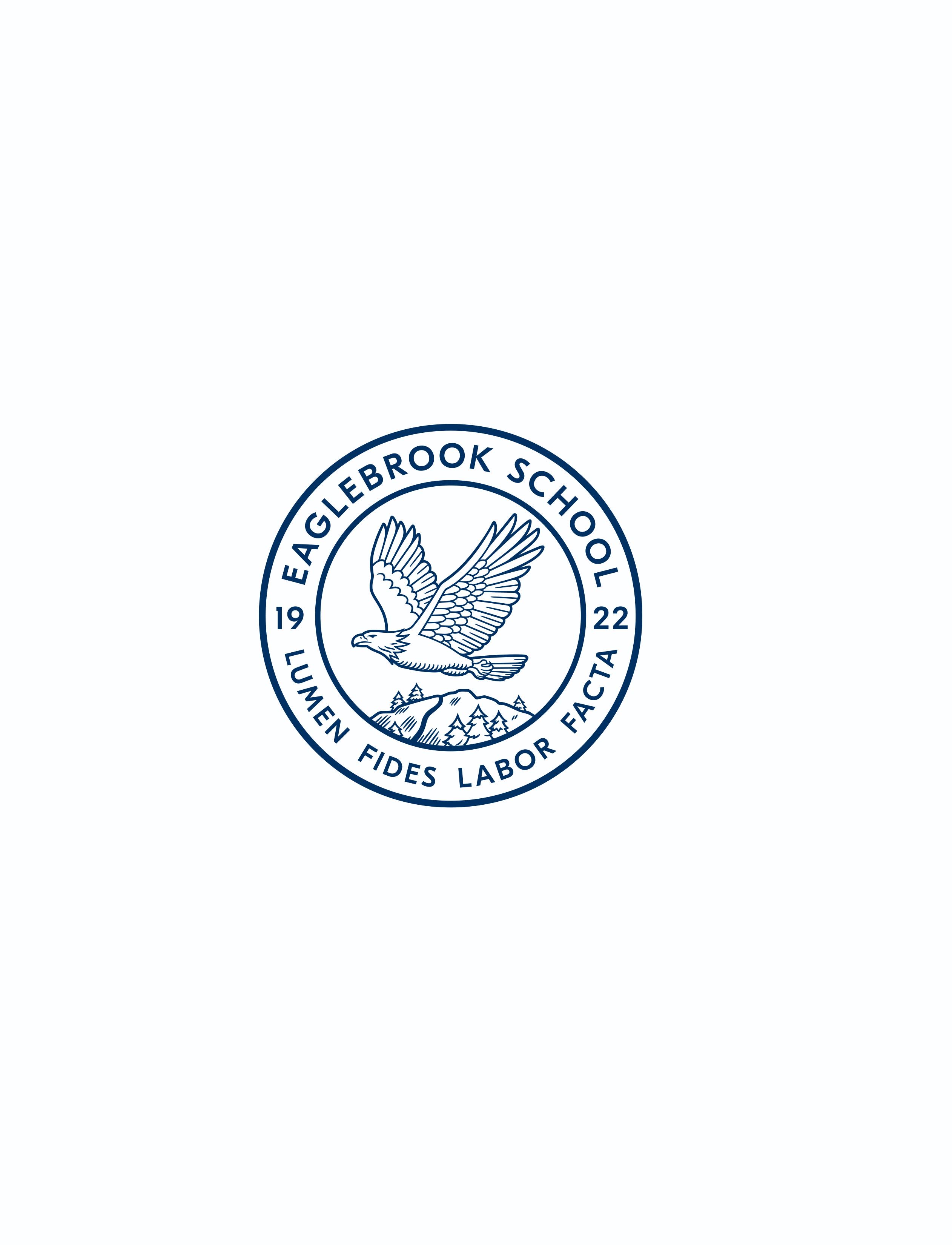


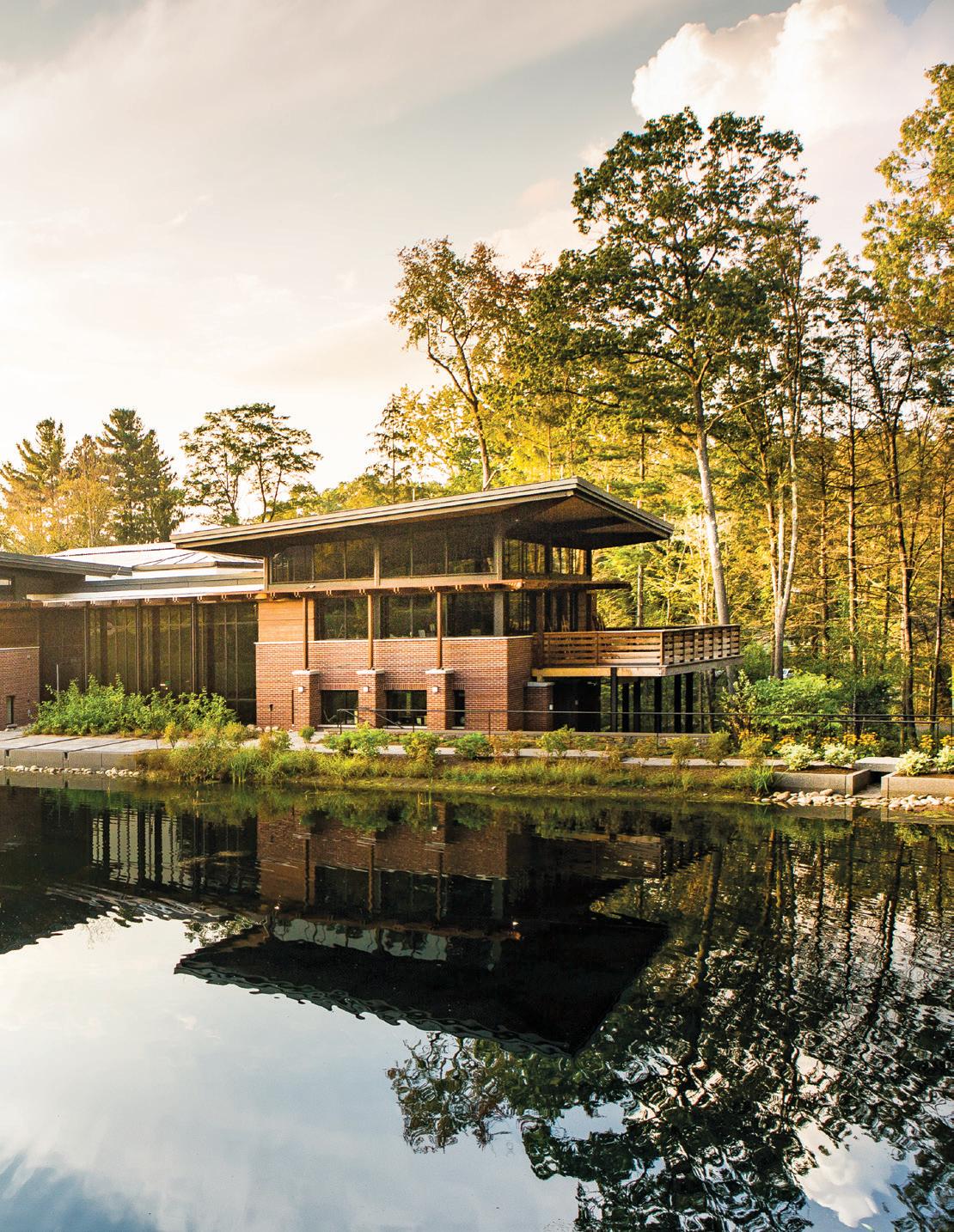
The most formative years in a boy’s life...








The most formative years in a boy’s life...



It starts with a spark—literally. Every new boy begins his journey at Eaglebrook around a campfire at the New Student Camp Out, meeting his “big brother” and building early bonds with his community. We find this tradition deeply apropos of an educational experience that sparks flashes of insight, curiosity, lasting friendships with peers and teachers, and deep and personal reflections on what it means to become a young man in today’s world. Peering into a microscope or staring into a campfire, students make intense discoveries that begin to form their solid foundations and love for learning, which they’ll come to rely on in secondary school and in life.


Active and enthusiastic, our youngest students enter Eaglebrook positively brimming with energy, eager to begin their journey on our hill. As educators, we understand that boys excel when they’re doing and trying, and we balance academics with hands-on experiments and lessons both in the classroom and outdoors. Our curriculum begins to build intellectual muscle, awakens creativity, and introduces our boys to what it means to be a student of academia, themselves, and the world. Whether we’re imparting organizational and time management skills or leading a physics experiment that leaves students in wonder, each boy ends the Third Form with the might, will, and maturity to thrive for the next three years.

The Third Form is unique at Eaglebrook, offering an easeful transition to boarding school and academic rigor.
Unlike other grades, Third Formers are assigned to one of two classroom groups, which act as grounding forces as they embark on an educational journey at Eaglebrook. Their teachers establish active learning environments, where students learn and study in small, tightknit groups. It’s here they begin to understand one of the defining characteristics of Eaglebrook: courage. We embolden our students to take risks each and every day—from speaking up in class to taking a course outside their comfort zone— the Third Form experience shows boys that our community is their safety net. We urge them forward, and we dust them off when they fall.
We understand that living away from home is new to most of our Third Formers, and our residential program offers additional guidance in areas like room cleaning, dorm jobs, study halls—as well as the nurturing that young boys need. Dorm Heads and advisors maintain close contact with the small group of Third Form teachers, ensuring that students are well cared for in all aspects of their lives on campus. Eaglebrook has a strong tradition of mentorship, and each Third Former is assigned a Big Brother—a Sixth Form student who will help shepherd him through his first year, recognizing when he needs faculty assistance with academic or social situations. Boys spend many hours outdoors on our beautiful campus, and they take field trips that awaken their senses and make learning fun and fascinating.
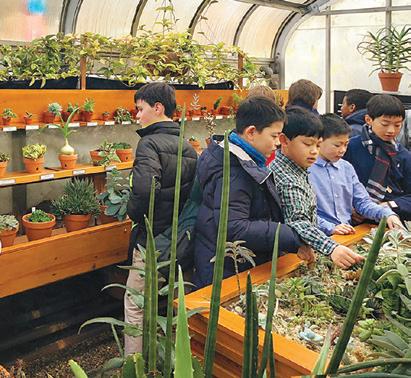


Third Form boys study:
T English
T History
T Science
T Math
T World Languages
This is a required class for all students in the Third Form.
T Woodworking
This is a required trimester class for all students in the Third Form.
They choose electives in:
T Visual Arts
T Performing Arts
T Technology/Design
T General Electives
Weekly field trips include:
T Great Falls Discovery Center
T Durfee Conservatory
T Hurricane Island
They engage in hands-on lessons like:
T Building a cardboard sled
T Making small machines
T Nature Plot Project
The educational journey looks inward in the Fourth Form as we ask boys to answer the essential question: Who do I want to become? We believe boys don’t simply stumble upon themselves, but they can make deliberate choices that define their character. As Fourth Formers, boys reflect on their strengths as they seek to understand how they want to conduct themselves in our community. Will a boy exhibit poise under pressure? Will he lend a helping hand? Will he push himself to think outside the box to solve a problem? Grappling with these scenarios—along with a year of challenging and active academics—allows Fourth Formers to develop respect for how knowledge and self awareness can shape who and what they become and their influence on the world around them.
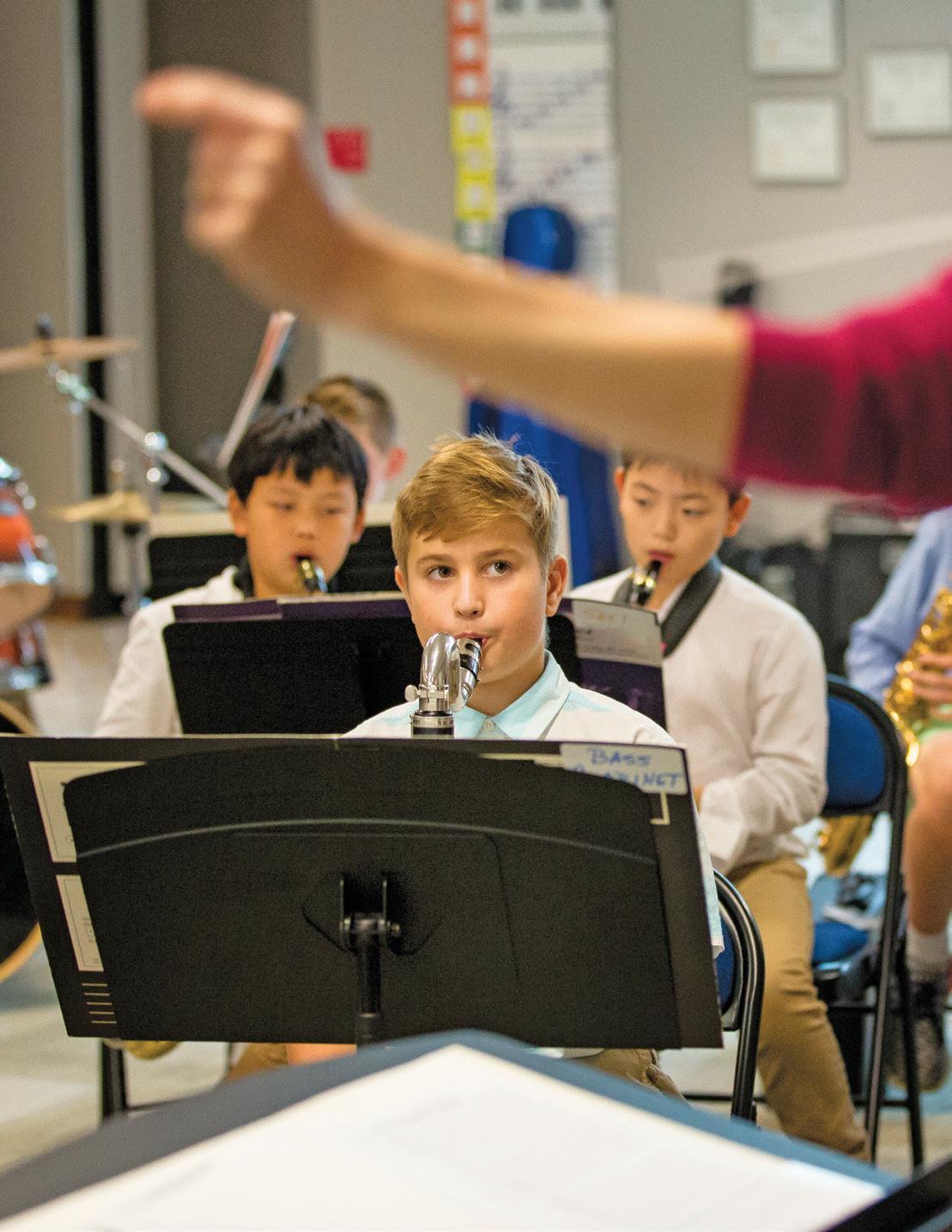
As Fourth Formers gain a better sense of themselves, we as educators learn more about them.
We revolve a constellation of support around each boy—advisors, counselors, Big Brothers, teachers, administrators—which allows us to get to know each boy’s personality, interests, and pitfalls (places where they might need guidance, such as seeking extra help). We know that all boys learn in different ways and vary in innate abilities. Classes are organized to meet the needs of each boy, offering an understanding and compassionate learning environment. At the same time, we have high expectations of our Fourth Formers, and we encourage them to stride beyond their status quo, to try new electives and activities, and to advocate for themselves.
In classes and in the residential program, Fourth Formers gain additional responsibilities coupled with more independence. Dorm Heads and advisors guide Fourth Form students in residential skills, such as cleaning their rooms, caring for their laundry, and staying attuned to their personal hygiene. Fourth Formers—like all of our boys—have the structured time they need to move, play, and learn outdoors. Field trips are oriented around the power of learning by doing, and they make classes like science and history relevant, exhilarating, and engaging.
FOR THE FOURTH FORM
Fourth Form boys study:
T English
T Colonial American History
T Science
T Math
T World Languages
Chinese, French, Latin, Spanish
T Foundational Art
This is a required trimester class for all students in the Fourth Form.
They choose electives in:
T Visual Arts
T Performing Arts
T Technology/Design
T General Electives
Field trips include:
T Connecticut Science Center
T Boston Freedom Trail
T Historic Deerfield
They engage in hands-on lessons like:
T Create a mathematical model and graph
T Designing a structure to withstand an earthquake
T Building a mini catapult





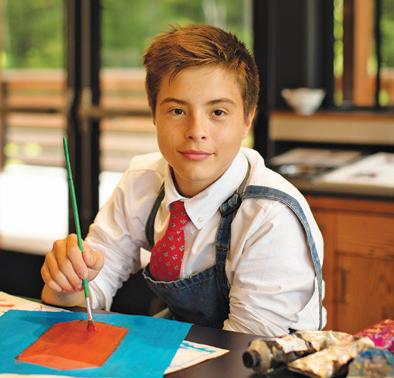
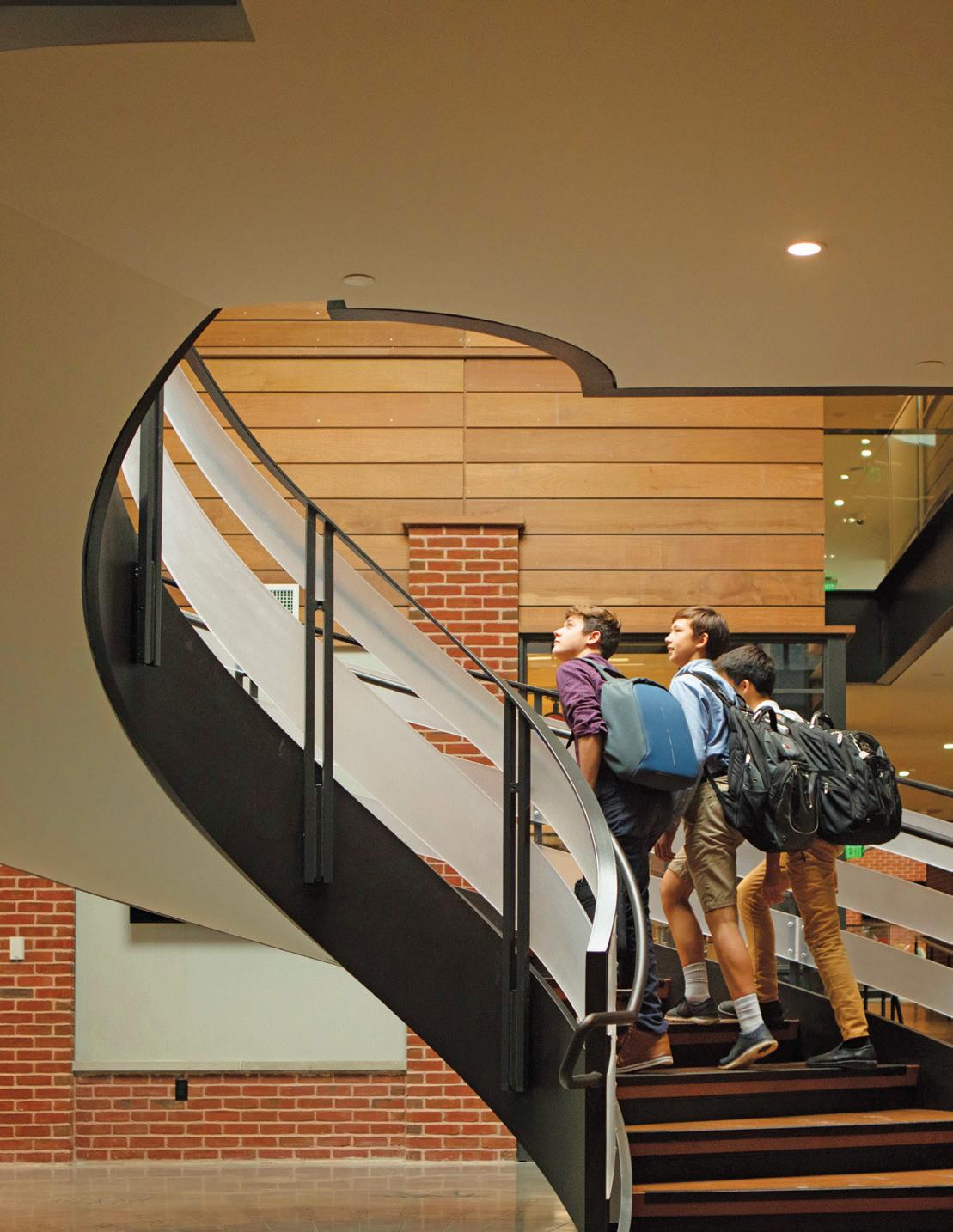
With a strong foundation underfoot, Fifth Formers set out to interact with the world around them. They become immersed in ideas by discussing and debating them, and then they try them out under expert guidance— fully entrenched in a learning environment that engages the mind through action. By now, Fifth Formers aren’t simply following instruction; this year is dedicated to sparking curiosity, giving boys the green light to set the agenda, pose questions, and seek answers. Along the way, they begin to develop the critical-thinking skills and problem-solving prowess that will lead to success in ninth grade and in secondary school.
Older and maturing, we begin to ask more of Fifth Formers academically and socially. Our curriculum becomes increasingly challenging, requiring students to speak up in class and manage their time to complete assignments.
As responsibilities and rewards are heightened, boys encounter additional opportunities to try, fail, and try again—a cycle we believe instills lifelong resilience and determination over adversity. Fifth Formers continue to have daily one-onone conversations with their advisors, but we also want older boys to start to independently navigate obstacles and challenges. In their Fifth Form year, we continue to encourage boys to take leaps, but now they become the driving force behind their progress.
Perched to become ninth graders, Fifth Formers are ready to take the helm as leaders of the school. In the residential program, they are expected to perform assigned dormitory jobs in the mornings and meet responsibilities on time. In daily campus life, we begin to ask Fifth Formers to be role models, reinforcing the welcoming tone for a school filled with pride, respect, and empathy. Now familiar with our outdoor setting, Fifth Formers continue to enjoy hands-on learning in our fields and open spaces, and they embark on field trips that expand their worldviews.

FOR THE FIFTH FORM
Fifth Form boys study:
T English
T American History
T Earth Science or Anatomy
T Math
T World Languages
Chinese, French, Latin, Spanish
T Health
This is a required trimester class for all students in the Fifth Form.
They choose electives in:
T Visual Arts
T Performing Arts
T Technology/Design
T General Electives
Field trips include:
T Museum of Fine Arts
T Leadership Day at Morse Hill
T Turners Falls Fish Ladder
They engage in hands-on lessons like:
T Creating 2D nets and folding them into 3D shapes
T Painting watercolors that symbolize themes in texts they are reading
T Using ThingLink to create connections between characters in assigned texts



When they reach the Sixth Form, boys have scaled a mountain—and not just the Pocumtuck range behind campus. They’re at the pinnacle of their Eaglebrook education, and the view is grand. This year is about leading, as mentors to their younger classmates and ambassadors of the school, Sixth Formers shape the community around them. Now leaders of the school and the culture, they embody our values of resiliency, honesty, determination, and teamwork. Each boy emerges from Eaglebrook prepared to tackle the challenges in secondary school and in every phase of life, planting a flag as he goes.
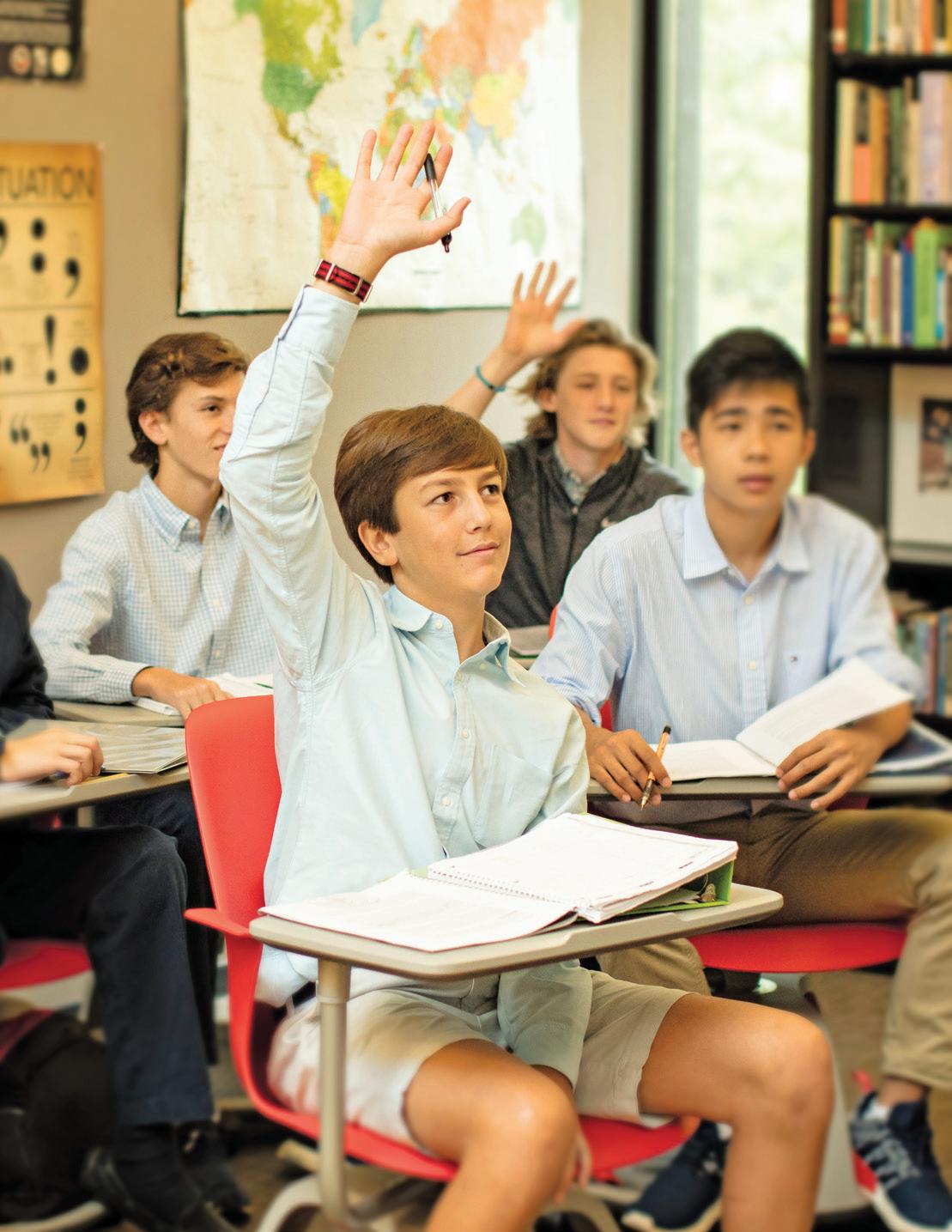
FOR THE SIXTH FORM
Sixth Form boys study:
T English
T World History
T Biology
T Math
T World Languages Chinese, French, Latin, Spanish
T World Views
This is a required trimester class for all students in the Sixth Form.
They choose electives in:
T Visual Arts
T Performing Arts
T Technology/Design
T SSAT Prep
T General Electives
Field trips include:
T New England Aquarium
T White water rafting trip
T Six Flags class trip
They engage in hands-on lessons like:
T Writing and designing black-out poetry
T Squid dissection
T Studying bats using an Echo Bat Meter


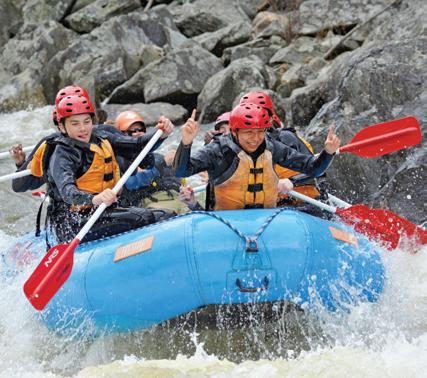



When students reach the Sixth Form, they are prepared to assume more responsibilities around school.
They serve as Student Council leaders, dormitory proctors, table proctors, team captains, committee members, and big brothers.
The Sixth Form year is filled with many valued traditions and milestones, including giving their assembly, being a proctor, applying to secondary-schools, and performing end-of-year ceremonies. In the residential program, Sixth Formers help to establish a home-away-from-home for their classmates, and they meet weekly with dorm faculty to discuss issues and concerns. As leaders of the campus and the school, Sixth Formers don’t just learn from the outdoor setting that surrounds them, they help preserve it. They take field trips that broaden their understanding of key topics and allow them to give back to the community, instilling a formative notion of service before self.
This is our Latin motto and the basis for values that are central to the community life of our students and faculty.
This is the light that comes from:
CURIOSITY OPEN-MINDEDNESS
DETERMINATION HUMOR
COMPASSION
This is the faith that is the foundation of:
This is the hard work that is required for:
ENGAGEMENT RESILIENCE
PATIENCE INDEPENDENCE
OPTIMISM
RESPECT TEAMWORK
COURAGE HONESTY
CONFIDENCE
These are the deeds that are reached through:
BALANCE RESPONSIBILITY
SCHOLARSHIP SERVICE
ACCOUNTABILITY
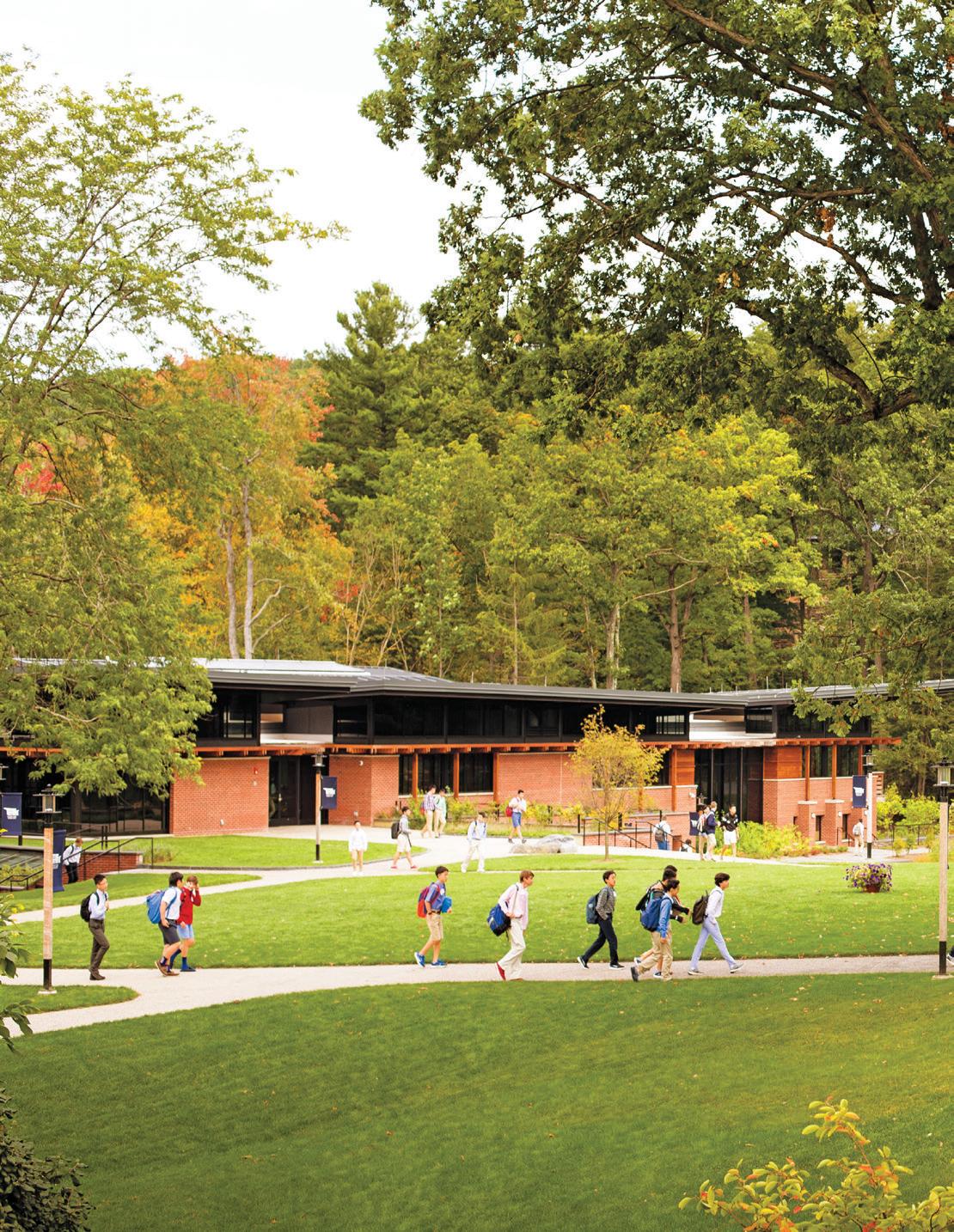

8:00 AM: Breakfast
8:30 AM: Morning Assembly
8:43 AM: Classes begin 12:00 PM: Lunch
12:35 PM: Classes resume
2:15 PM: Study hall
3:00 PM: Sports 5:00 PM: Free time
6:00 PM: Dinner
7:30 PM: Study hall
8:45 PM: Wind down 9:45 PM: Lights out

Our school day begins with an all-school assembly. Most often the assembly is a presentation by a Sixth Former about a topic of special interest to him, although there are also presentations by faculty, outside speakers, and classes.


Think of our English curriculum as chapters, with each year building on the next until we reach our Sixth Form conclusion, when boys graduate as accomplished writers and readers. Beginning in the Third Form, we lead boys to develop the skills to write clearly, read literature effectively, use grammar correctly, and expand their vocabularies. We use a methodological approach to writing, helping boys understand how to build the foundation of various forms— from poems to journal entries to short stories to research papers that will be expected of them in secondary school. Along the way, we introduce boys to groundbreaking and transformative works of fiction and non-fiction, giving them opportunities to understand the world through the perspectives of a wide range of authors. In the Sixth Form, we offer an honors section to accommodate students who have demonstrated exceptional ability and motivation in English.


Eaglebrook is a musical place, with boys singing and playing instruments every day. Along with analyzing, practicing, composing, and performing music, boys participate in drama, learning to act in, write, and direct plays and musicals. Many students are new to performing arts, training their voices, ears, and stage presence for the first time, and we welcome boys who have never sung a note, strummed a cord, or recited a sonnet. At the same time, we offer advanced performing arts classes to boys ready for a lead role in a production or first chair in band. Boys can join band, jazz band, chorus, or string orchestra, and can audition for the a cappella group, The Eaglebrook Ad Libs, who sing the National Anthem each year at Fenway Park. To make sure boys hit all of the notes, they also study the history and theory of music.


“Question everything.” This is the ethos of our science department which places a high value on inquiry-based learning. In every grade, we give students the opportunity to develop inquisitive, analytic minds, whether they are studying invasive species and logging fieldwork journals in the Third Form, building structures to test Newton’s laws of motion in the Fourth Form, or examining body structures through dissections in a lab in the Fifth Form. By the Sixth Form, students explore genetics, heredity, and evolution using modern lab techniques that include DNA electrophoresis and genetics transformation. In all of our science courses, we emphasize the ability to clearly communicate through scientific writing and to accurately measure and record data—the skills necessary to move forward within the sciences.



Oil paints, ceramics, digital photography, stained glass, printmaking, woodworking, and stone carving—these are just a handful of the mediums boys can pursue alongside our talented and invested visual arts instructors. With access to light-filled art studios and exceptional tools, like ceramic wheels and digital cameras, boys can allow their creativity to soar. Classes are offered to boys who are just beginning to think of themselves as artistic, as well as serious students building an art portfolio. By studying visual arts, boys learn how to care for materials and tools, to express themselves through various techniques, to receive feedback from teachers, and to graciously critique the work of their classmates.


Learning languages unlocks other cultures, giving students a “passport” to discover and communicate with people different from themselves. We encourage all students to develop and maintain proficiency in at least one language other than English, choosing Mandarin Chinese, French, Latin, or Spanish. Our curriculum, from beginning to seminar courses, strengthens students’ interpersonal, interpretive, and presentational communication skills in the target language. At the same time, studying a language allows boys to develop empathy and open mindedness about communities around the world. In addition to receiving engaging classroom instruction, boys in advanced courses have opportunities to practice their language beyond the classroom setting.

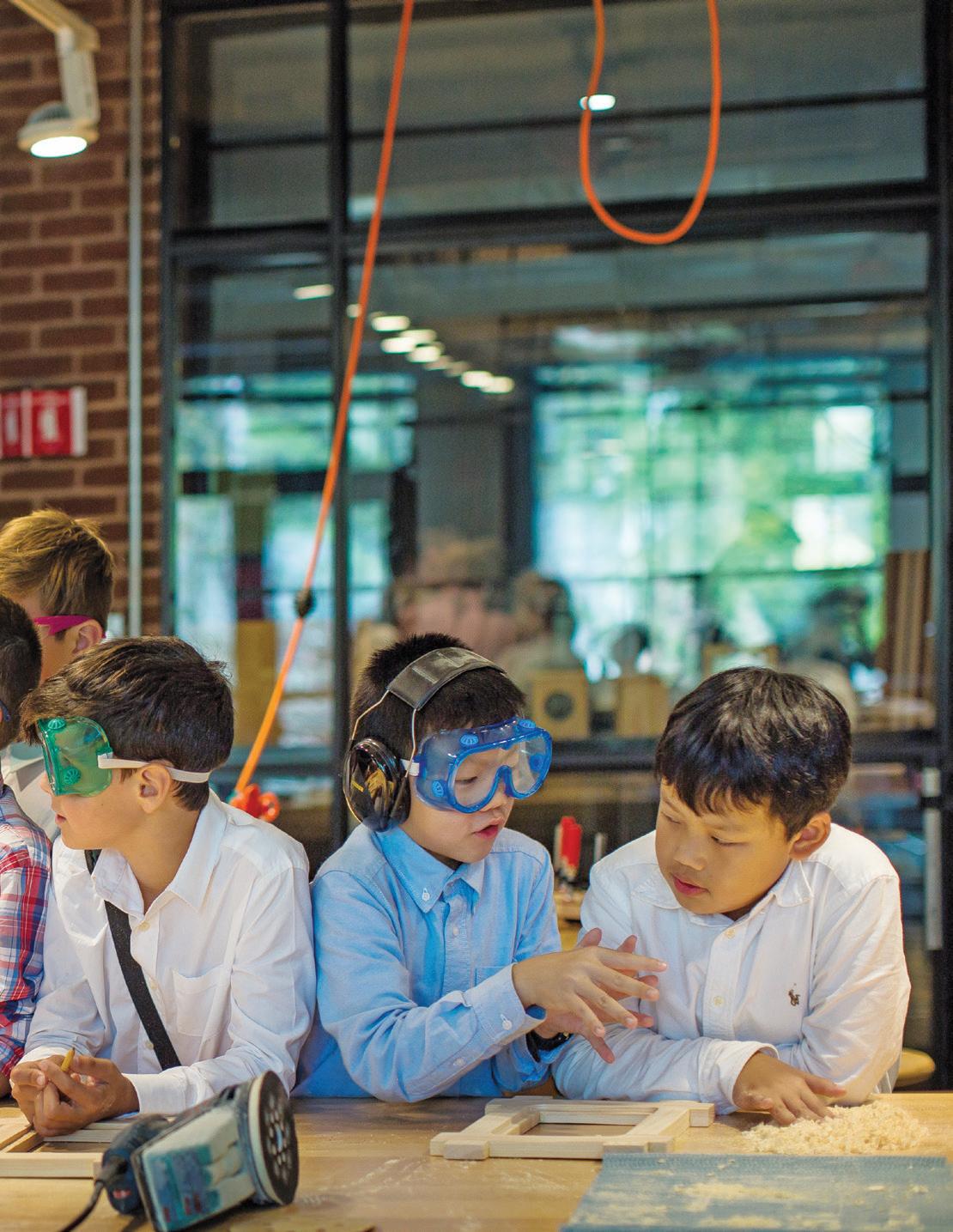
Every boy at Eaglebrook brings his own interests and has the opportunity to discover new ones. General elective courses allow boys to pursue the topics that fire them up and to take courses outside of their purview. Our goals are to nurture the areas boys already gravitate toward and to push our boys to try new things. Depending upon the availability and individual interests of the faculty, students might take courses in comic book art, financial literacy, fly fishing, rocketry, sustainability, and video editing. Sixth Formers are required to take a course called World Views, which examines the ethical questions behind many of the contentious issues in today’s world and provides students the opportunity to regularly engage in civil discourse and reflection. Each student should have plenty of elective options to choose from during his time at Eaglebrook.
We are committed to teaching middle school-aged boys the skills they will need for the rest of their lives, and they are able to do that in an environment that is beautiful, comfortable, and safe.
Eaglebrook School seeks to incorporate these Core Skills into all aspects of our community of learning.
Ability to develop one’s passions and interests
Ability to understand type of learner one is
Ability to seek out additional help
Ability to modify approach to situation in keeping with one’s learning style
Ability to take responsibility for one’s actions
Ability to read information
Ability to take notes effectively
Ability to conduct research
Ability to listen effectively
Ability to use technology appropriately to gather information
Ability to write effectively
Ability to speak effectively
Ability to listen effectively
Ability to use technology appropriately to communicate
Ability to listen effectively
Ability to analyze information
Ability to judge validity of information
Ability to use creativity and imagination
The ability to connect and express ideas in unique ways
The ability to speak and write of feelings and emotions
The ability to use a variety of media to show ideas and emotions
The ability to solve problems with imagination and creativity
Ability to maintain an organized academic life
Ability to put plans and guidelines into action
Ability to maintain an organized extracurricular life
Ability to use study time effectively
Ability to use technology appropriately for organization
Ability to work and collaborate as part of group
Ability to appreciate and respect differences
Ability to understand the connectedness of the world
Ability to act as a responsible cyber citizen
Ability to maintain a good diet
Ability to practice cleanliness and hygiene
Ability to get proper rest and exercise
Ability to manage stress
We recognize that all students learn in different ways, vary in their innate abilities, and come from a variety of educational backgrounds. Classes at Eaglebrook are organized to meet the needs of each boy.

Believing that strong reading and analytical skills are critical for both academic success and a rich life, our English Department’s curriculum is literature based. Teachers seek to introduce their students to a wide range of classical and modern literature and choose from a suggested reading list that features novels, plays, poetry, and short stories that are both of interest to adolescents and well regarded by scholars. We also help students gain a consistent and common understanding of figurative language within literature. To foster this, teachers teach short stories, a few novels, and a play along with common literary terms and concepts. Because the ability to express oneself in writing is also central to success in a number of realms, there is a strong emphasis on developing clear, concise, and organized writing using carefully considered literature as a starting point. To bolster the study of these areas, we also have specific curricular goals in grammar and vocabulary. To help ensure that all new material is clearly grounded in material that has already been studied, each class is structured so that each grade group will review the important elements of previous year’s material as preparation for the introduction of new topics for learning.
The goal of the science curriculum is to provide students with a strong foundation in core scientific skills while instilling genuine interest in and enthusiasm for the sciences. Our science faculty come from a wide range of backgrounds and are given the freedom to explore personal interests and the students’ passions within the subject area. A curriculum is followed throughout the year, with the goal of having students master various concepts in each topic. A cornerstone of the department is to allow students to learn through hands-on activities, experimentation, and observation. We share the belief that providing the students a chance to engage with the material will allow them to understand it. Our labs spark creativity while allowing students to observe, ask questions, and think critically.
The Mathematics Department believes middle school learners are at a unique and critical point in their development, and our teaching methods are specifically designed to meet their needs at this stage. We also presume that the skills and concepts of arithmetic, algebra, and geometry form a useful and necessary language, which has application in the greater world and is the foundation to all mathematics courses that follow throughout a student’s educational journey. Understanding and application of these skills and concepts is the underlying premise of all of our teaching. Much of our work revolves around helping individual students learn and gain confidence, while having some fun along the way. Students are exposed to mathematics through four learning lenses: abstract thinking (algebraic expressions and equations); concrete thinking (tables and numbers); visual thinking (graphs and diagrams); and verbal thinking (explanation and descriptions). Measuring and knowing what students are learning provides the feedback to guide them through our curriculum. Our goal is that all students depart Eaglebrook with confidence and competence in their ability to problem solve and to learn.
The History Department seeks to help students actively engage the past through a study of diverse times, places, cultures, and events. Students are encouraged to consider multiple perspectives to develop a personal connection with history. Our faculty members impart their passion for history through classes that relate compelling historical narratives. These classes are the forum in which shared learning is carried out in a cooperative, supportive, and enjoyable environment where students are encouraged to participate. Underlying all of this is a sustained emphasis on the historian’s basic skills of reading, writing, research, and critical thought.

Eaglebrook School embraces the diversity that our international students bring to our community. In the English as a Second Language (ESL) Department, we take each student’s language, educational, and cultural background as a starting point. It is our intent to cultivate in each student the skills to express himself with confidence, clarity, and ease in various academic and social settings. Supporting this process is best accomplished in small classes so that rich perspectives can be exchanged and language skills practiced at the appropriate proficiency level.
The Academic Support Department works in partnership with families and faculty to encourage thoughtful, informed communication regarding a student’s learning profile. We recognize that each student has a unique learning style and acknowledge that each child learns differently. We believe that each student possesses strengths and experiences that enhance all learning, and we work to reinforce areas that need additional attention. The Academic Support Department understands that every student has a responsible role in his own learning and, through a guided process, helps to promote that independence in each student.
The philosophy of the Music Department is based on the belief that music can support and enhance the educational experience of all Eaglebrook students. We also believe that practice and performance are linked and therefore strongly support both solo and group performances on and off campus. Performing helps students see the benefits of their practice and gain confidence and joy in the reaction of audiences to their performances. On campus performances also contribute to school unity and spirit in a vibrant way, enhancing the Eaglebrook educational experience.
General Electives are one trimester courses that span a variety of subject areas and are often cross disciplinary. Examples: Comic Book Art & History, Computer Programming, Exploring the Design Thinking Process, Financial Literacy, Fly Tying & Fly Fishing, Juggling, Relax & Read, Lifeguard Training, Robotics, Rocketry, and Video Editing.
Every boy at Eaglebrook brings his own interests— and has the opportunity to discover new ones.
All students at Eaglebrook are encouraged to develop and maintain proficiency in at least one language other than English, either modern or classical. The goal of our language program is to help students develop abilities to communicate successfully in the target language. The curriculum is designed to:
n Help students develop various strategies and study habits to strengthen communication skills, including interpersonal, interpretive and presentational modes in the target language.
n Assist students in gaining linguistic, social, and cultural knowledge of the communities in the world where the target language is used.
n Create opportunities for students to use the target language outside the language classroom.
Third Form students study Latin. Fourth, Fifth, and Sixth Form students choose to study one of the following languages: French, Latin, Mandarin Chinese, or Spanish.
Art education provides individuals with increased awareness and a deeper understanding of the world in which they live. In recognition of this certainty, our Art Department faculty are committed to providing a diverse and vibrant art curriculum to students. Through exposure to a range of media, students are provided valuable opportunities to develop and expand personal perceptions while concurrently acquiring the skills necessary for success in our rapidly evolving and interconnected cultures. The creative process assists students in the discovery of innate talents and a broader recognition of the unifying nature of art and its distinct function in our daily lives. We believe that the search for one’s identity is an important and integral component of adolescent life and that through the discovery of newfound passions in the arts, and the further practice of those previously acquired, the Eaglebrook boy will gain a number of measurable life skills while concurrently acquiring an enhanced sense of a competent and confident self.
We strongly believe that our athletic program teaches valuable life lessons of commitment, cooperation, and sportsmanship. By experiencing the thrill of competition, the exhilaration of a personal physical triumph, or the camaraderie of a team pushing its boundaries, boys discover their true characters.
Boys have the opportunity to choose competitive and non-competitive sports each season, and our teams are suitable for players of all sizes and abilities.


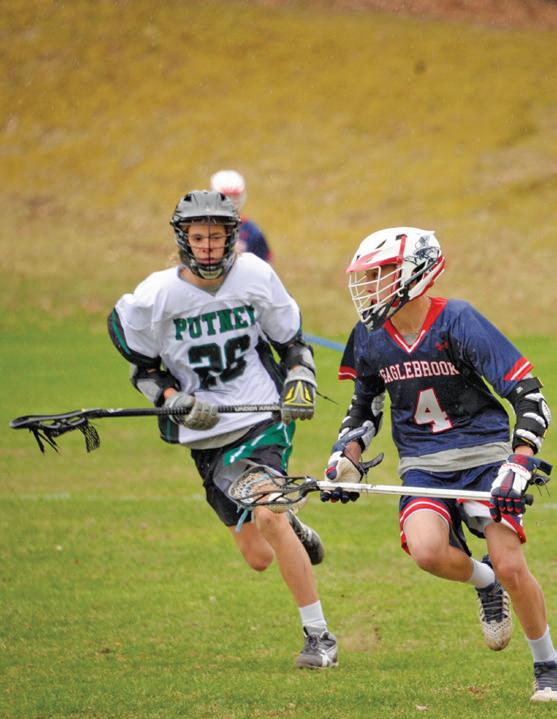



The Matthews Family Tennis Center includes eight all-weather asphalt courts, two of which are illuminated for nighttime play.
The Schwab Family Pool is a 42’ x 75’ six lane pool with a one-meter diving board. The Evans Fitness Center is also located in the pool facility.
The Lewis Track facility has a 1200-meter six lane all weather running surface. Within the track there is a field to host all other track and field events, as well as to accommodate soccer and ultimate disc.
The Alfond Arena contains The McFadden Ice Rink. In the fall and spring, a plastic surface is installed to help the facility serve as an indoor field house.
The Memorial Sports Center consists of basketball courts, a rock climbing wall, a golf simulator room, six squash courts, and The Neme Lounge
There are 15 acres of athletic fields that serve baseball, football, lacrosse, soccer, and ultimate disc programs. Of the 750 acres of land that we own, approximately 600 acres are forested. A cross country running course, mountain biking and hiking trails, camping areas, outdoor science class areas, and garden plots are some of the ways students enjoy and explore the outdoors.





Eaglebrook’s ski area is on campus just a short tromp away through the snow on the Pocumtuck Ridge, which allows boys to hit the slopes right after their classes and on weekends in the winter. In operation since 1923, the ski area includes the Macomber chairlift, a snow-making system, and a snow groomer, giving skiers of every level a chance to learn the sport or to prepare for competition. Many skiers in the Eaglebrook School Ski Program have achieved collegiate, national, and international fame in the snow sport world. We have a nationally recognized ski patrol, and all students are welcome to strap on their skis during winter weekends for fun and practice.
FALL WINTER SPRING
Studying and creating art is central to how boys better express themselves, fine tune their time management and self-advocacy abilities, and reflect on the world around them. During every trimester, each boy has the opportunity to pick up a paintbrush, design and print a project on a 3D printer, perform on a stage, learn an instrument, or sing in a choir. Many of our students are new to the arts, training their artists’ eyes (or ears) for the first time. Others have already dedicated hours and years to their mediums, and they are ready to take their talents to the next level.
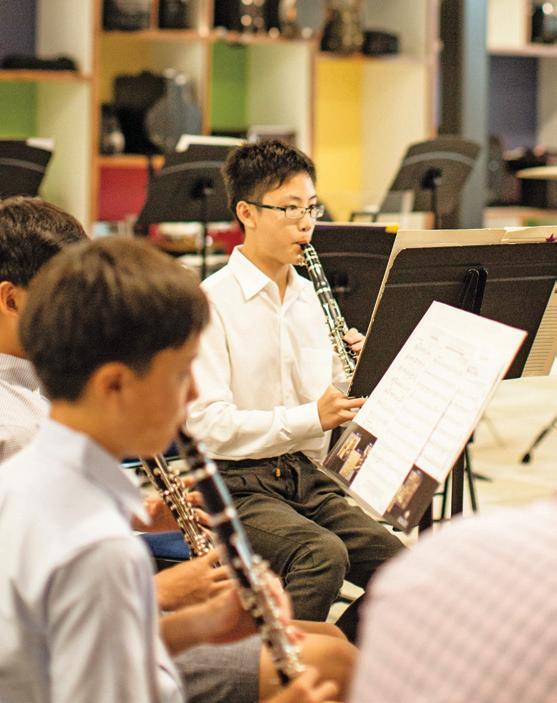




T Band
T Chorus
T Jazz Band
T String Orchestra
T Ceramics
T Digital Photography
T Drama
T Drawing
T Painting
T Stained Glass
T Stone Carving
T Woodworking
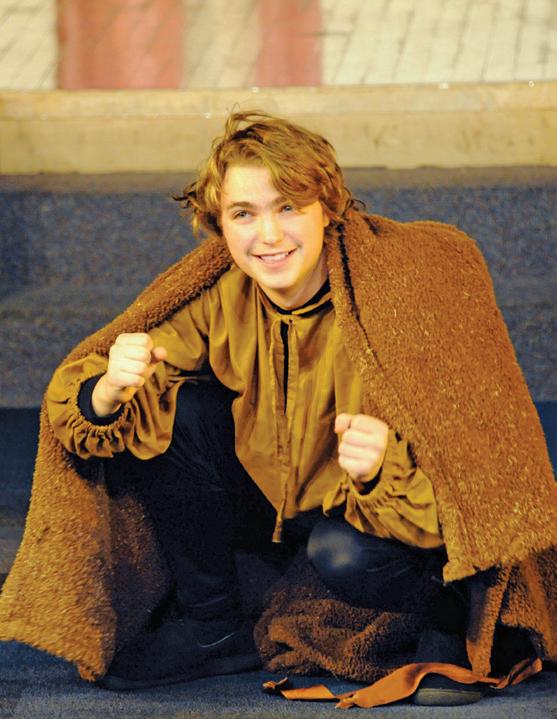

All boys receive instruction from trained artists with outstanding backgrounds in visual and performing arts who help develop and deepen their skills and knowledge.
Dorm life at Eaglebrook looks a lot like home life because we intentionally create a welcoming, family environment. At the same time, boarding here is also a learning opportunity.
The poet John Donne wrote that “no man is an island,” and the same can be said about Eaglebrook boys. Each boy embarks on his education with an advisor by his side, whom he interacts with every day. Advisors are crucial touchpoints for boys, offering mentorship and guidance as many are living away from home for the first time. Together, advisors and students celebrate successes and persevere through challenges, and they develop a familial bond that lasts for years to come. In fact, students are welcomed into their advisors’ homes on Wednesday Home Nights, when they laugh, talk, and dine together alongside advisors’ children and pets. Under the careful watch of advisors, students get the direct attention they need and deserve during this pivotal age.
Picture this: A boy drops his backpack off in his dorm and checks in with his dorm parent about his day. Later, he’ll finish his homework in his room, popping out to ask this same parent for help with a math problem. Before bed, he’ll join his fellow boarders—some from all over the world— to hang out and talk. Living in a community is a powerful motivator to be the best version of oneself, and it’s in our six dormitory houses that boarding students truly deepen their sense of responsibility, patience, and care for others. Boys are assigned dorm jobs on a rotating basis to help establish stewardship over their Eaglebrook homes, and older students are “big brothers” to younger students who share their houses.

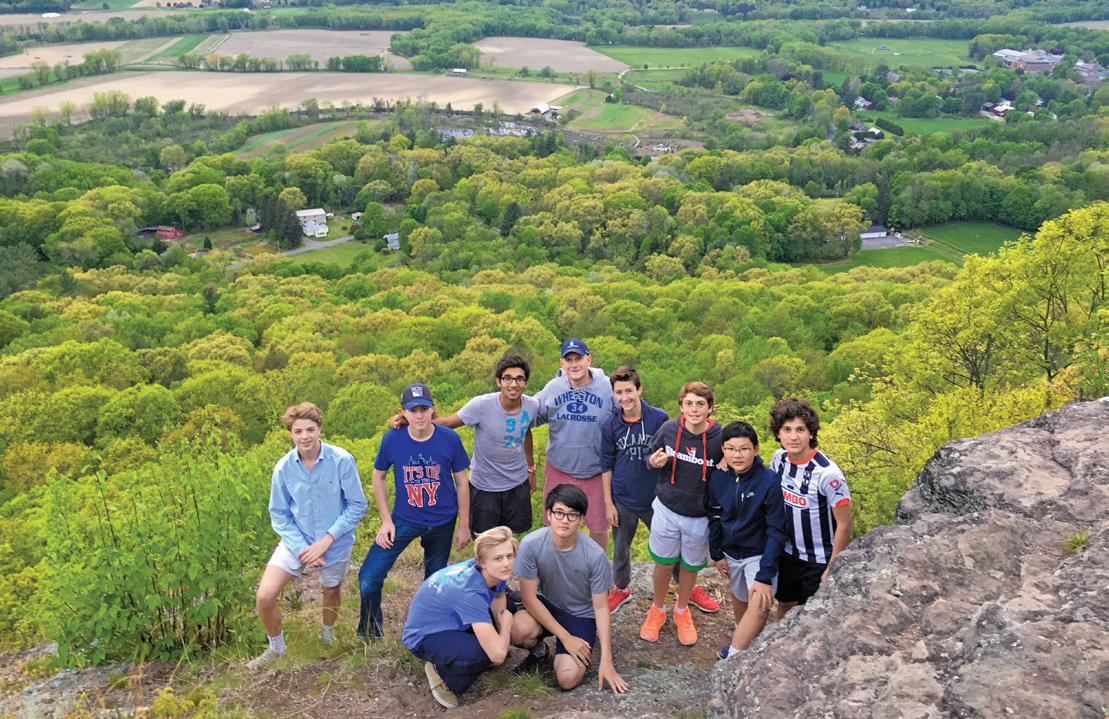
The Health Center has nurses who care for the students’ routine health issues and also give allergy shots, flu vaccines, manage immunizations, dispense all medications, and make arrangements for emergency care. They triage injuries and oversee the continued care of injuries. A doctor has regular appointments 3 days a week. We have two counselors on staff with regularly scheduled appointments and drop-in times as well as being available 7 days a week. The Health Center has nurses on duty seven days a week, twenty-four hours a day.
Most students live with a roommate, all within a dorm of 40 other boys, and 6 to 8 faculty. The Skills of Citizenship, being a responsible member of the community and taking part in group activities, are fundamental to the daily activities in each dorm. Being responsible for personal belongings, respecting the belongings of others and the school, and taking part in daily community service oriented tasks help to develop awareness of citizenship. Each student also takes part in daily routines, which are intended to promote the Skills of Healthy Living. Time is set aside for activities related to personal hygiene and students are given reasonable rising and bed times. Limits on food, electronics, and other items help students practice good habits within the dorm. Required attendance at meals reinforces good habits for regular, healthy nutrition. The structure of our dormitory routines, including the evening study halls, also supports the Skills of Organization and Time Management, which begin in the classroom.
Each weekend students have many different opportunities to get involved with a variety of activities. Day students are welcome on campus any time. Weekends at Eaglebrook provide different venues for faculty and students to spend time together sharing in service and outdoor activities and athletic events, where they frequently learn new skills and explore areas of interest. We want our students to learn to become more independent and to balance a variety of commitments and social interactions while gaining new skills. Weekend Elective Activities are often service oriented, such as raking and campus clean up in the fall and spring, and boarding students are assigned randomly to activities, which allows both faculty and students to work with a variety of community members. It
also means that students try activities they might not have otherwise experienced. In the winter the activities are more varied and students have the opportunity to select them online. We encourage students to get involved and make a plan for the weekends. Often students are initially reluctant to try new things, but when encouraged to try something new, they find they can have fun. The opportunities that students have to try many different activities from art to academics to sports to outdoors are unique. Balance and social interactions are also key components to our weekends. Faculty and advisors are aware of what the students are doing and help guide them to take full advantage of their weekend time.



We take our responsibility to feed growing boys seriously, and the staff in the Gibbs Dining Hall prepare hearty and healthy meals that satisfy boys with rumbling stomachs and hollow legs. The menu changes weekly, but always in rotation are fresh, local foods sourced from farms close to campus. Boys eat at assigned, faculty-led tables, and they also serve as waiters. The tradition of family-style meals help boys develop manners, the ability to carry on a dinner conversation, and to clean up after themselves and others. The entire Eaglebrook community awaits Sunday Brunch, a delicious, relaxed meal, with the smell of local maple syrup wafting across campus.
We help each boy land at the right secondary school for him —whether he’s inclined to small schools, urban environments, challenging academics, or robust art and athletic programs.
Our Secondary School Advising Office works closely with families and students to identify a list of target schools and to set goals to gain enrollment. Our secondary school advisor builds strong relationships with students over several years to understand their aptitudes, interests, and achievements, helping to hone in on the best secondary school fit.
We guide each boy through every stage of the secondary school admissions process, including writing essays, completing applications, and applying for financial aid. Students can easily find teachers, coaches, and advisors who can eloquently speak to their talents and traits in recommendation letters. And courses at Eaglebrook naturally elevate students’ writing and public speaking skills, giving them the tools they will need as they write compelling admissions essays and answer questions about themselves in secondary school interviews.
“As one light kindles another, nor grows less, so nobleness enkindles nobleness.”
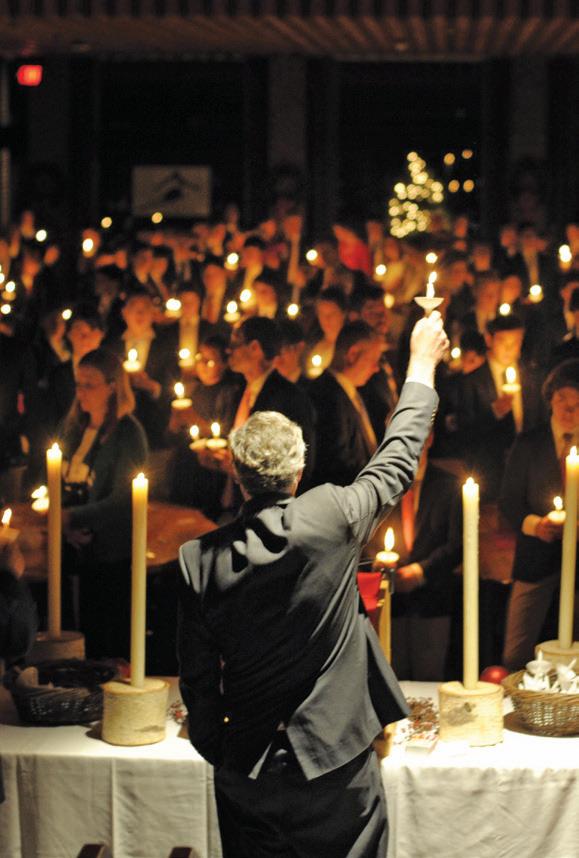
Our headmaster repeats this line at the Candlelighting ceremony on the evening before Winter Break begins, the room aglow with candles and shining faces—one of many important and beloved traditions that help to define and celebrate the school. Throughout the year, boys look forward to taking part in traditions and rites of passage that build community and school spirit, including Sixth Form Assemblies, Home Nights, Hilly Chase, Country Fair, Winter Carnival, and Good Fellow. These traditions, passed on for generations, enliven the Eaglebrook experience, and they remain the most potent of memories for our graduates.




On Mountain Day, we spend the day in Jaffrey, New Hampshire hiking Mt. Monadnock together. Students get to enjoy the outdoors and exercise while taking in the beauty of autumn in New England from a new altitude.

Every other Wednesday evening, students take a night off from homework and attend a Hilly Chase presentation in the assembly area. Hilly Chase nights include music concerts, dramatic performances, an annual talent show, and more.

The annual Country Fair is held every fall on campus. Run almost entirely by students and their advisors, Country Fair is one of the great New England fall festivals.

Before winter vacation, after dinner and caroling, the dining hall lights are turned off and the Headmaster leads the Candlelighting ceremony. Sixth Formers come to the front of the room to have their candle lit, then return to their tables to light the candles of those around them.

On Sunday afternoon at 5:30, students gather in the Assembly Area. Our Sunday Meeting program focuses on spiritual growth. A variety of speakers from inside and outside our community join students and faculty for this weekly gathering.
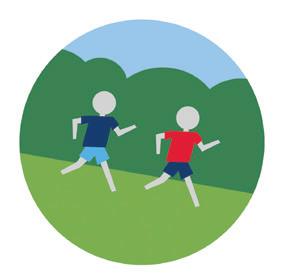
Field Day is an annual competition between our six dormitories. Students participate in a variety of activities, including an egg toss, push ups, juggling, running, Frisbee throwing, wiffle ball hitting, and more.

Eaglebrook’s Winter Carnival in February is the second oldest winter carnival in the nation and offers a variety of contests, races, and winter sports for students and their families.

At the close of every school year, the members of the Sixth Form vote for a classmate who best exemplifies the spirit of Eaglebrook. That person is called the Good Fellow, and the reward for earning that title is a dunk in Whipple Pond.

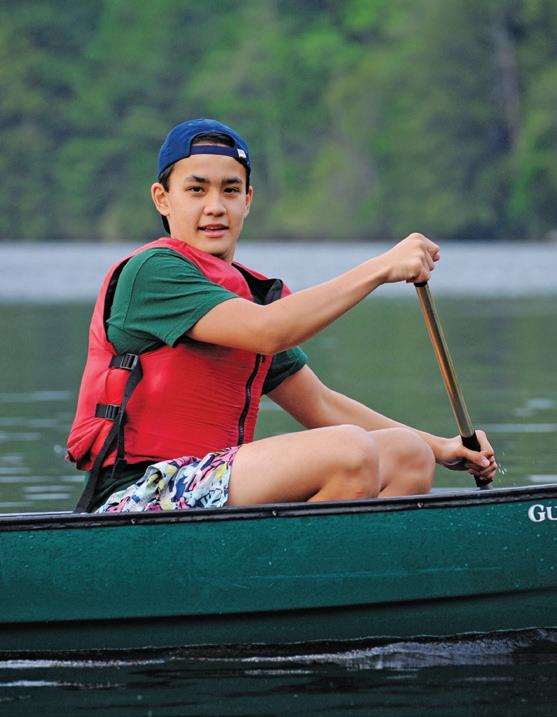
A crucial component of our mission is to teach boys to respect nature and to be capable and self-sufficient in the outdoors. The Outdoor Program uses our spectacular 750 acres as an outside classroom, where boys learn to fish, start a campfire, pitch a tent, and identify the wildlife around them—all the while gaining valuable life lessons as they cast a fly or single out Orion’s Belt in the night sky. Each weekend in the fall and spring, boys can choose from a variety of faculty-led outdoor activities, including camping, canoeing, fly fishing, rock climbing, hiking, biking, maple sugaring, white water rafting, and trap, skeet, and target shooting. We maintain numerous campsites on the property, and Whipple Pond— in the center of the campus—is stocked annually with both bass and trout for fishing.
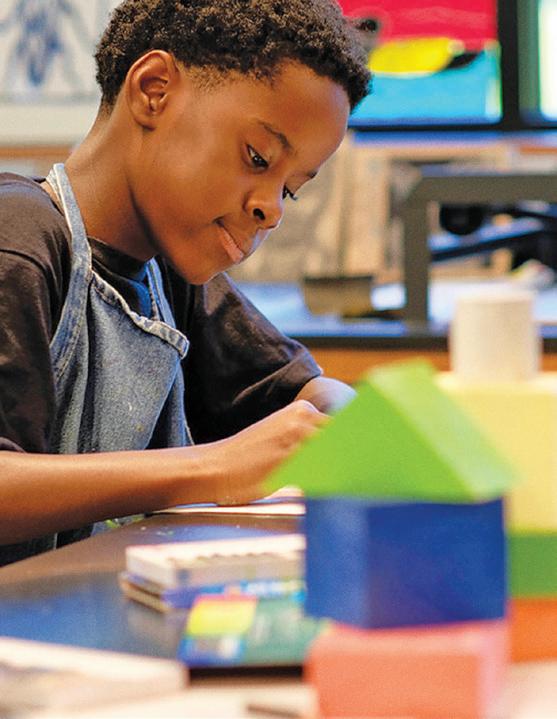

While enjoying the fresh air and physical challenges, boys learn how to securely take risks, adapt to changes, and to be mindful of the environment around them.
Eaglebrook Summer Semester combines study and play for a true summer adventure like no other. This four-week coeducational boarding program invites students ages 10-13 to choose from a wide range of classes that pique their interests, and to join fun-filled summer activities like woodworking, sports games, and eating ice cream in the sunshine. Over the course of the month, students also take field trips to places like Six Flags Amusement Park, Hampton Beach, and the Boston Science Museum. The program is designed to build confidence through achievement and to foster leadership skills in the classroom, on the playing field, and within the school community. Students from all over the world attend Summer Semester, making it a multicultural environment on our mountainside.




Howard Gibbs, an Amherst graduate and friend of Headmaster Frank Boyden of Deerfield Academy, had a vision for a younger boys’ boarding school that combined a healthy outdoor life with education. He wanted boys to develop their innate abilities, discover new interests, and gain deserved confidence. Eaglebrook Lodge, a sanitarium and former hunting camp on 27 wooded acres in the hills of Western Massachusetts, seemed the ideal place for his school. In 1922 Mr. Gibbs bought the property and transformed it and its buildings into Eaglebrook School. He enrolled 15 boys that first year.
After Mr. Gibbs’ unexpected death, Thurston Chase, an Eaglebrook teacher and recent Williams College graduate, took over the school. Under his leadership, student enrollment expanded to 165 students, and the physical plant grew to include a gymnasium, tennis courts, learning center, science building, and four new dormitories.
When Thurston Chase retired, his son Stuart Chase ’47, assistant headmaster at New Canaan Country School in Connecticut, became Eaglebrook’s headmaster. Stuart Chase saw the school grow to 175 boarders and 58 day students. While he was headmaster, the school bought 500 adjacent acres and added new playing fields, a track, a modern ski area with snow making and a chair lift, two new dormitories, a swimming pool, and a hockey rink.
Andrew Chase ’73, Eaglebrook’s former director of development, son of Stuart and grandson of Thurston, is the current headmaster. He and his wife, Rachel Blain, have three children: Calla ’07, Lucy ’10, and Sam ’12. Three generations of Chases have remained true to Mr. Gibbs’ vision for his school, and although the school continues to grow in its range of offerings and facilities, we still nurture young boys and help them realize their talents. The woods, fields, and mountain trails continue to provide students with the healthful life that Mr. Gibbs considered so valuable.






Eaglebrook, founded in 1922, meets middle school students where they are in their development and encourages them to build on their innate skills and discover new interests introduced in the classroom, in sports or in music, art, and drama. Our students thrive because the skills they acquire bring them successes in all of the parts of Eaglebrook life. They gain a sense of pride and confidence through their achievements whether in academics, athletics, or the performing arts.
At Eaglebrook the natural world draws students into the outdoors: an overnight at a school campsite, mountain biking on tree lined trails, skiing on our mountain side, a science class beside the pond, or a sunset lighting up the surrounding hills. The school was founded on the idea that students learn best when connected with nature.
Eaglebrook’s faculty is large: 75 men and women secure in their values and trained in their fields of interest. These teachers know their students, help them with their classes, give them individual attention, and provide for them a second home. Our teachers are able to channel the energy and enthusiasm of middle school students into learning skills, finding interests, and developing values.
Eaglebrook is a global community. Our students come from all around the world, and they enrich school life with their interests, their cultures, and their differences. In such a multicultural environment, students meet differences with curiosity and appreciation. We want our students to be open to the world and when they leave Eaglebrook to have the knowledge and values that will continue to bring them success.

ANDREW C. CHASE ‘73 Headmaster

